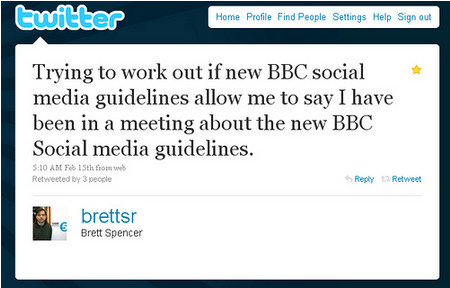5 Elements to Include in your Corporate Social Media Policy
Living in the days that Social Media has become a common tool for corporate crisis management – in some cases causing the crisis and in others attempting to tame the uproar a crisis has produced – it has become necessary and mandatory for businesses to have a Social Media Policy. This should be a document that is often re-visited and reformatted to keep up with the times. But how are they written? What should be included in one? After dissecting several major corporate social media policies, I came up with a list of findings that I think should be included and what to steer away from.
Where to Start? The Basics
It is key to think about the readers when creating your policy. Are all employees required to read it or only a select group? The entire company should be responsible for reading a company’s Social Media Policy, just as they need to read all other company policies. This could mean there are a number of different skill levels, positions within the company and ages of employees reading it, therefore it must be short, to the point and easy to understand.
My findings: When looking through other corporate Social Media Policies, I found a few similarities and some missing elements as well.
1. Consistently use consistency
A Social Media Policy should not replace or be a part of the company’s Code of Conduct, but should include similar principles. A company’s mission statement or ‘vision’ should even be included within the details of the document in order to keep it fresh in people’s minds and make sure their actions are uniform across all platforms that a business is being represented on. It is very important that community managers of a company’s social media sites stay consistent in how they are representing the company and are also transparent.
2. Keep it [In]formal
I discovered that most of the Social Media Policies seem to be written informally, as opposed to very structured, boring and wordy company policies you often see. Since social media is so informal and a place to be fun and well, social, it makes sense for the policy to be. After all, you want people to read it and retain the information, so why not make it an easy, even fun read?
3. Who you gonna call?
Many of the policies even go as far as to include someone’s contact info for further questions. For a large company, I would say this is a must; especially if all employees are required to read it. What if someone writes a nasty post on a company Facebook page and an employee who is not responsible for managing the company’s social media catches it first? Who can he/she call? What should he/she do? If they know to refer to their company’s Social Media Policy and the answer isn’t covered, tell them who to contact ahead of time.
4. School, at work?
I found many of the policies included optional courses so that employees could understand how to use social media for the company in more detail. This has become an option that many large companies are starting to incorporate in their business practice. Some type of social media training should be a requirement for any community manager of the company’s social media accounts. Many companies are even starting to employ online courses and tests, whether mandatory or optional that will grant employees ‘certifications’ after successful completion.
5. Social Networking vs. Social [Not]working
I was surprised to find a lack of rules about using social media in the work place. Since most people who are managing a company’s social media sites (along with most of the general public) have at least one account in some type of social media, I find it important for people to understand they are not immediately granted access to waste their work days away playing on Facebook after they have read and agreed to the company’s Social Media Policy. There is a huge grey area here that is certainly difficult to address, but I think it’s important to at least mention in some way that there is a difference between managing a crisis for the company on Facebook and uploading all the pictures from the bar last night during work hours.

From Intel’s Social Media Guidelines:
These are the official guidelines for participating in social media for Intel. If you’re an Intel employee or contractor creating or contributing to blogs, wikis, social networks, virtual worlds, or any other kind of social media, these guidelines are for you. They will evolve as new social networking tools emerge, so check back regularly to make sure you’re up to date.
Participation in social computing on behalf of Intel is not a right but an opportunity, so please treat it seriously and with respect. If you want to participate on behalf of Intel, take the Social Media@Intel training and contact the Social Media Center of Excellence. Please know and follow the Intel Code of Conduct. Failure to abide by these guidelines and the Intel Code of Conduct could put your participation at risk. Contact social.media@intel.com for more information. Please also follow the terms and conditions for any third-party sites.
From Coca Cola’s Policy:

These Online Social Media Principles are intended to outline how these values should be demonstrated in the online social media space and to guide your participation in this area, both when you are participating personally, as well as when you are acting on behalf of the Company. It is critical that we always remember who we are (a marketing company) and what our role is in the social media community (to build our brands) . The same rules that apply to our messaging and communications in traditional media still apply in the online social media space; simply because the development and implementation of an online social media program can be fast, easy, and inexpensive doesn’t mean that different rules apply.
The Company encourages all of its associates to explore and engage in social media communities at a level at which they feel comfortable. Have fun, but be smart. The best advice is to approach online worlds in the same way we do the physical one — by using sound judgment and common sense, by adhering to the Company’s values, and by following the Code of Business Conduct and all other applicable policies.
Take a look at some of these Social Media Policies as a reference:
– IBM Social Computing Guidelines
– Cisco Internet Postings Policy
– The Coca Cola Company Online Social Media Principles
– Dell Global Social Media Policy
– Ford Motor Company’s Digital Participation Guidelines
– Intel Social Media Guidelines
– Microsoft Tweeting Guidelines
– Walmart Social Media Guidelines
Other good articles about Social Media Policies:
– 5 Noteworthy Examples of Corporate Social Media Policies from Hubspot
– Disclosure Best Practices Toolkit from SocialMedia.org
– A list of Corporate Social Media Policies from Social Media Governance
Images via TechCrunch and cambodia4kidsorg
About Lauren Formalarie
Lauren Formalarie is a Project Manager and Trainer at SayItSocial, focusing on digital marketing strategy and project development as well as live, virtual and eLearning training initiatives.

Like What You Are Reading? Subscribe To Read More
Join our mailing list to receive the latest news and updates from our team.






























